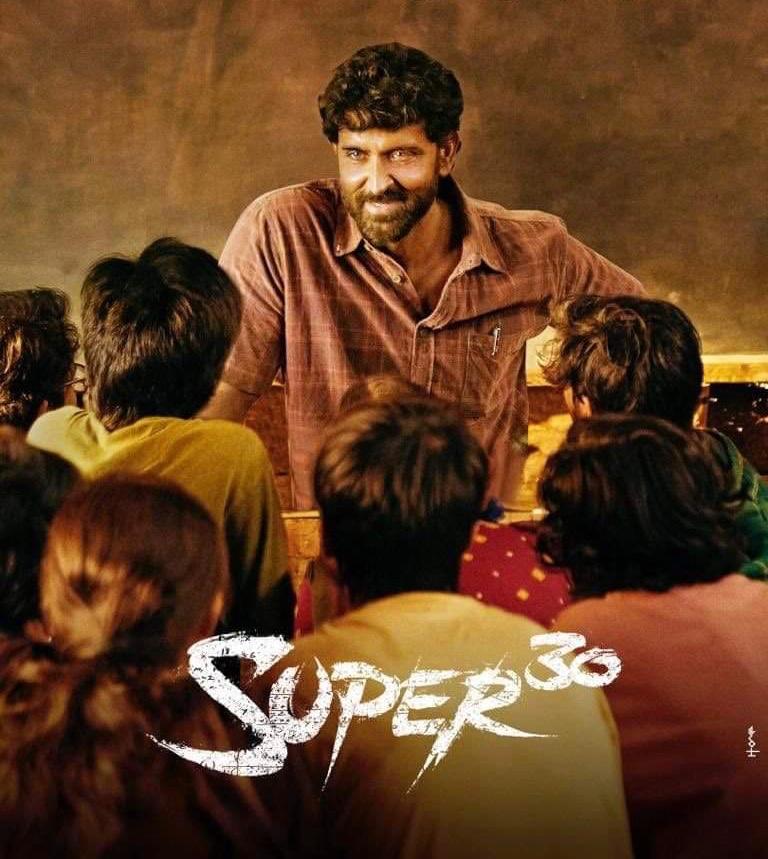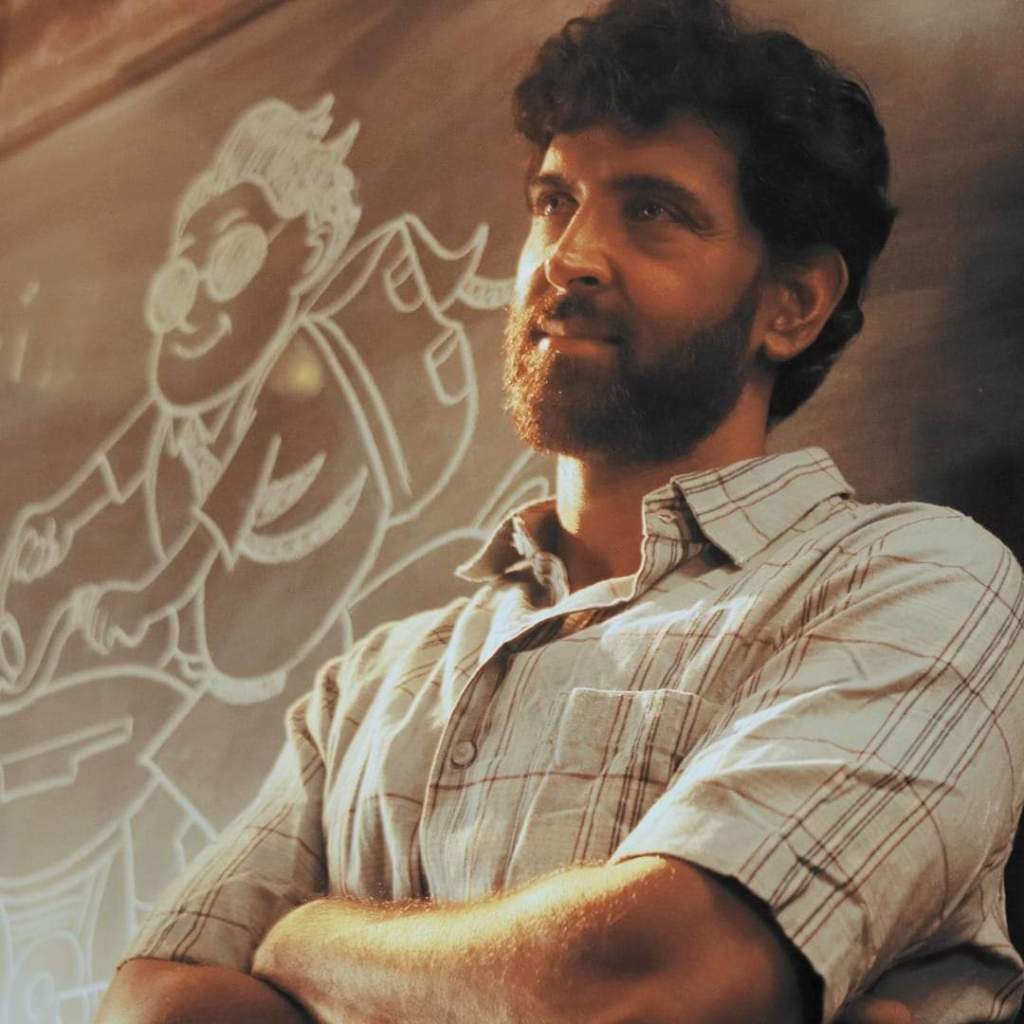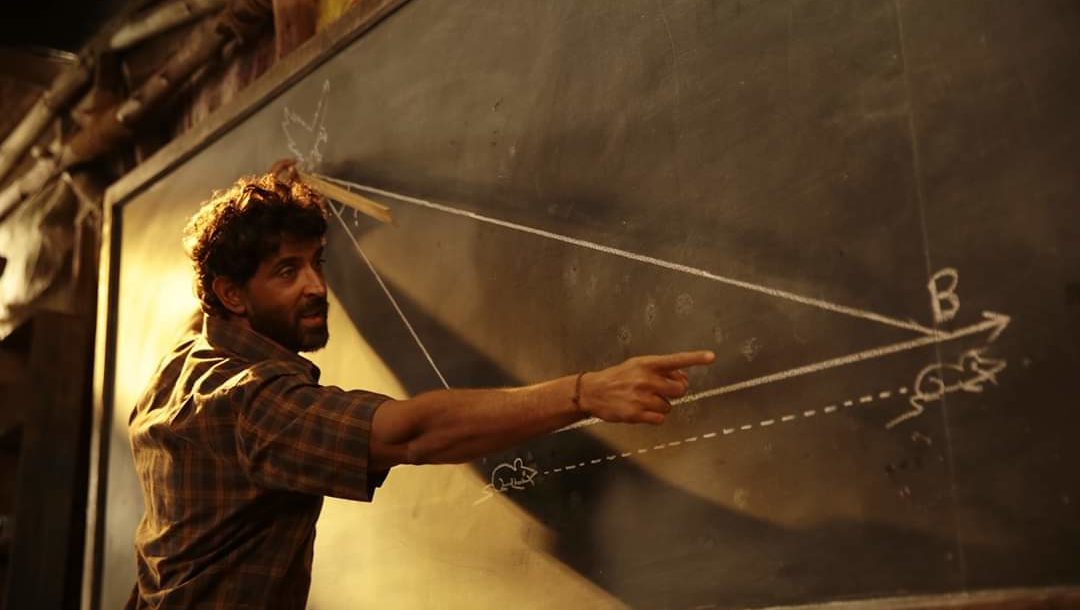In one scene, early on in the film, Anand Kumar (Hrithik Roshan) is getting that year’s gold medal issued by Ramanujan awards, he receives it and goes back to stand in line and realises that the boy standing next to him, who came second has received more than a medal. Anand blinks his eyes, upset with the discovery. The first thought we have is that it’s Hrithik Roshan’s dyslexic Rohit (Koi Mil Gaya) in a muddy bronzed make-up standing there. That act continues for a while, the more impoverished and gloomier he feels, his body language and facial expressions immediately goes back to the Rohit mode. And considering he is playing the namesake of a real-life genius mathematician based in Bihar, the actor’s inability to internalise the character is a huge downer. What evidently sticks out is the actor’s makeover. Since he doesn’t look anything like the real Anand Kumar and because the character belongs to a lower caste, economically backward community, the director feels lavishly browning his face, grimy clothes and a Bihari accent (that goes completely off-key) will perhaps give him a more “authentically poor look.”
Vikas Bahl’s Super 30 is about Anand Kumar, a mathematician and teacher who started a free IIT coaching centre for underprivileged children in Bihar. What could have been an inspiring triumph-of-the-underdog story is let down by a narrative that seems too formulaic and unbelievably predictable.

The opening scene itself leaves signs of what to expect, where a young Indian scientist (Vijay Varma) presents a rhetoric in Hindi to an audience consisting of foreigners who are strangely laughing and clapping at all his lame jokes. Even the speech is such a jingoistic cliché about how the various multinational companies are headed by Indians.
Read More
- Movie Review : ‘English Vinglish’
- Did Thalapathy Vijay shine in Lokesh Kanagaraj’s LEO?
- Mall of Muscat solidifies its position as the country’s leading fun and entertainment destination by launching Fun VR
- Three-time Oscar nominee Piper Laurie dies at 91
- TAS Weekly: The fascinating rise of Omani singer Jihad Al Raisi
Set in a milieu that looks more staged than real, Bahl typically opts for the easier way out—he demonises the privileged to make the staging easier for the lesser privileged but ends up trivialising them. So, the economically underprivileged kids are not only underfed, miserable and kind, they also urgently require a shower as they are presented as dirty and unkempt. While the privileged boys and girls have shampooed (blow dried) hair, speak perfect English and laugh at the lesser privileged.
Anand Kumar lives in a backward part of town, with a postman father, mother and a brother. There are a few nice touches initially, especially between Kumar and his lover (Mrunal Thakur who is criminally underutilized) and how he equates numbers with her beauty and even writes a love letter with numbers. Thakur’s screen time is restricted to Kathak spins in resplendent kurtas and looking longingly at him.

One of the better sights of the film has to be Anand’s father (Rajendra Kumar) though the character’s introduction isn’t well-defined. Humour, though well-intentioned often falls out of sync—like the scene when his father tells his mother not to give away her only woollen shawl and she says—“Mujhe nahi chahiye. Main waise bhi hot hoon.” Or even that scene, where a woman accuses him of sexual harassment and it turns out she doesn’t even know what he looks like, also had a distasteful meta movie reference to it, considering the director was recently mired in a #metoo controversy.
There is a corrupt, almost comical Minister, Devraj Jagan, who reflects what is exactly wrong with the system. It would have been a one-note characterisation but gets salvaged by a terrific Pankaj Tripathi. There is a scene where Anand Kumar and his dad meets him at the office as he has promised to fund his Cambridge education and Tripathi’s reactions are subtle, but you would gladly wring his neck. And it’s as effective when the subtilty goes a few meters up in another scene where he warns Lallan Singh about Anand’s rising popularity. Anand’s rival is Lallan Singh, Devraj’s accomplice and heads the educational mafia, who initiates Anand into the IIT Training centres.
The initial portrayal of a dedicated almost obsessive mathematician soon turns into a saviour-of-the-poor narrative and its fraught with inconsistencies, in turn reflected in the actor’s performance. Though one cannot call it an entirely failed act as towards the last half, he does get into Anand but by then it’s too late.
There are 30 students, played by new actors but none of their stories or struggles register as their characters are weakly written. You only see dark gloomy faces, like sad emoticons floating over. Besides the director is too invested in Kumar’s journey.. There are a lot of sub texts—the battle between entitled and deserving (“It’s not necessary that only a King’s son becomes a King” being the constant refrain), the education mafia, the class divisions, but it’s all let down by predictable storytelling and uninspired casting. Even if you haven’t read about Anand Kumar, it’s easy for you to predict the events. Because the real-life character’s story is so compelling, and because the narratives around underdogs in cinema are inevitably motivating, Super 30 had the potential to be engaging cinema. But the cinema never quite lives up to the inspirational tale.







